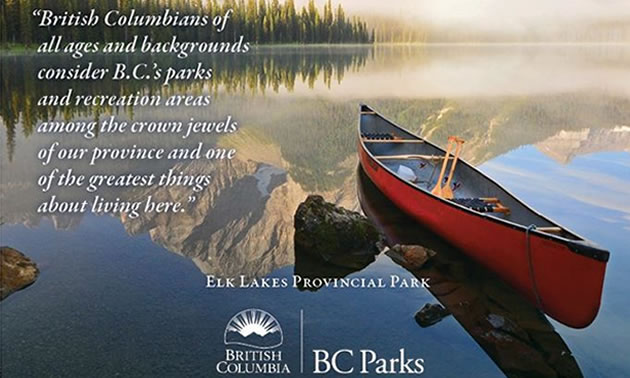BC Parks Future Strategy to feature stronger conservation, more campsites

The Province will build on its world-renowned provincial parks system by hiring more park rangers to enhance conservation, improving services for persons with disabilities and launching a new BC Parks Foundation so community groups, businesses and individuals can come together and have a voice in BC Parks priorities.
In addition, the Province will add more than 1,900 new campsites to help meet growing demand. More than 800 of the sites will be in provincial parks and over 1,000 will be in recreation sites, delivering a range of camping experiences in areas of highest demand. The commitments are contained in a new BC Parks Future Strategy, “Protecting our Legacy Together”.
“BC Parks define who we are as British Columbians and are a vital part of the B.C. advantage,” Premier Christy Clark said. “Protecting our world-class parks for future generations ensures we continue to attract global attention through tourism, investment and research, as we honour our natural history and as families create lasting memories together.”
As part of the BC Parks Future Strategy, the Province will invest up to $22.9 million over five years for campsite expansion in provincial parks and recreation sites, and will allocate funding in 2017 for other recreation and conservation initiatives. The Province continues to invest $15 million to maintain and refurbish existing campsites and backcountry recreation sites throughout B.C.
The BC Parks Future Strategy can be viewed here: http://www.env.gov.bc.ca/bcparks/future/
“Stewardship of the land and ensuring our natural environment’s well-being through heightened conservation is government’s core responsibility, and we will be increasing our investment through the upcoming budget,” Premier Clark said. “The parks we love are globally significant. Protecting and enhancing our parks honour our natural history, is a gift for future generations and to the world.”
The strategy celebrates First Nations heritage and cultural values and seeks to reflect their unique ties to the lands and waters that make protected areas special. It also includes new opportunities for First Nations, local governments, community groups, businesses, other stakeholders and the general public to have a greater role in making sure BC Parks continues to provide globally recognized recreation and conservation.
“We know British Columbians are passionate about our parks,” said Environment Minister Mary Polak. “But the world has also taken notice. Similar to what we’ve accomplished with the Great Bear Rainforest, our success in delivering unparalled experiences with nature has brought increasing demand to accommodate more people, programs and facilities. The investments we’re making and the opportunities our strategy provides for all British Columbians will help to support a strong and secure parks system for generations.”
In addition to new campsites, recreation and conservation investments, the BC Parks Future Strategy will see the Province contributing a $5-million endowment to seed a new BC Parks Foundation to allow private-sector donations to be managed independently. The foundation will help generate private revenue, to be spent on promoting and enhancing the experience in BC Parks.
“People come from all around the world to visit our BC Parks,” said Jobs, Tourism and Skills Training Minister Shirley Bond. “This year, more than 4.5 million international visitors have come to our province and many of them have been drawn by the spectacular natural beauty of our parks. The new BC Parks Future Strategy will provide visitors with even more options to stay and explore parks like the newly created Ancient Forest near Prince George and gives visitors even more reasons to want to #exploreBC.”
Other programs are also being established within the BC Parks Future Strategy to give individuals the opportunity and choice to support BC Parks. This includes dedicated BC Parks licence plates, where proceeds will be reinvested into provincial parks. In partnership with ICBC, the design of the new plates will be unveiled and available for purchase in the coming weeks.
Quick Facts:
- B.C.’s provincial parks receive more than 21 million visits each year.
- Parking is free in all provincial parks, making them more accessible to families.
- BC Parks manages the third largest parks system in North America behind the United States’ National Park Service and Parks Canada.
- British Columbia has the highest percentage of its land base dedicated to protected areas of all provincial Canadian jurisdictions.
- B.C. offers a range of camping experiences in provincial parks as well as recreation sites.
- There are 10,700 campsites in 270 B.C. park front-country campgrounds and 2,000 backcountry campsites.
- There are 10,400 campsites in 1,500 recreation sites.
- Over the past five years, the Province has invested approximately $60 million in park facilities, delivering projects directed at attracting young families, offering new recreation opportunities and increasing attendance.
Learn More:
The Province recently announced changes to the Discover Camping Reservation Service for the 2017 season, which aim to improve fair access for everyone. For more details, please visit: http://www.env.gov.bc.ca/bcparks/reserve/








